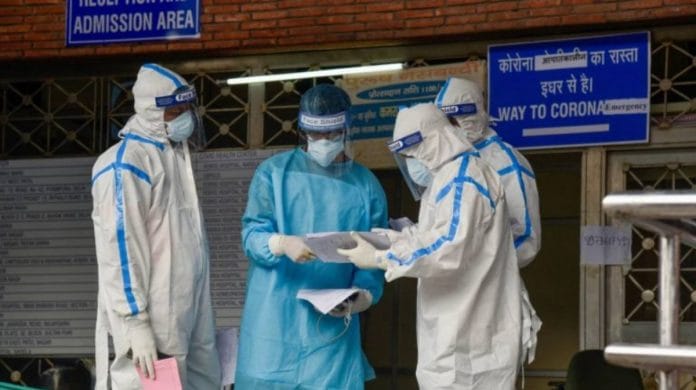New Delhi: Fewer coffee breaks, no catch-up time with colleagues and less informal chat in the corridors — this is what healthcare workers have been going through while dealing with the Covid-19 pandemic during which “prioritising breaks” becomes utmost important, said an article published by the British Medical Journal (BMJ).
The opinion piece, titled ‘Breaks at breaking point — doctors need to take time out in a pandemic’, emphasised that “the demands on healthcare workers are high, shifts are long, and urgent work is carried out in the shadow of a rapidly accumulating backlog of ‘normal’ work”.
Published on 2 October, the article has been written by four authors — Julia Allan, Daniel Powell, Kathleen Ferguson, Emma Plunkett — all of who are health psychologists and anaesthetists working in the United Kingdom.
Calling for prioritising breaks for healthcare workers, the article said: “Breaks are important in any line of work, under any circumstances, but should be considered essential in the present situation where work is particularly mentally draining.”
“It is the timing and presence (or absence) of breaks within the work period, rather than overall workload, which is critical.”
The authors warn that “as we move into the next phase of the pandemic with winter and a potential second wave on its way, it’s more important than ever to prioritise breaks”, while adding “work demands remain high, and mass disruption to services ensures that change and unpredictability will continue for the foreseeable future”.
Also read: Over 10,000 healthcare workers tested positive across 10 states, UTs since Covid struck
How stress changes behaviour of health workers?
According to the article, several commentaries by experts have pointed out “an increasing ‘Covid fatigue’ among healthcare workers, a state compounded by the disappearance of normal periods of respite — fewer chances to grab a coffee, no time to catch up with colleagues, less informal chat in the corridors”.
The authors of the article have quoted several other studies to show how stress among healthcare workers could lead to a change in their behaviour and health-relevant decisions.
It said: “Even in times of normal service, health-relevant decisions and behaviours change as time on task increases.”
For instance, it showed that “general physicians are more likely to prescribe unnecessary antibiotics towards the end of clinics, compliance with hand hygiene protocols declines from the start to the end of shifts, surgeons are less likely to decide patients require surgery towards the end of shifts, and telephone helpline nurses become progressively more likely to refer callers to other healthcare professionals as time since last break increases.”
Performance gets slower as time on task increases
The authors used an example of a Japanese student, Tsuro Arai, who set herself the “masochistic task of solving complex multiplication problems continuously over four 12-hour days”.
Arai provided the “first firm evidence” that humans cannot maintain “cognitive performance over 12 hours without a break”.
“Instead, performance becomes slower and less accurate as time on task increases, only returning to normal after periods of respite,” the authors wrote.
Replicating the scenario to the present times, they said: “Healthcare workers are regularly working lengthy periods without a break, trying to deal with a pandemic that has been ongoing for many months in an already over-stretched health service.”
Hence, they added that “enabling adequate breaks during this period, and applying lessons from fatigue research to practice, will be essential if performance, well-being, and safety are to be protected going forward”.
The article also recognised that the “work in a pandemic is novel and unpredictable”, which required workers to adapt rapidly to “an evolving situation, thinking flexibly, solving problems, staying focused and remaining vigilant to change”.
“In the pandemic, this balance has been reversed and human cognition is simply not designed to operate in its most effortful mode for protracted periods. Extended periods of high-level thought quickly lead to fatigue and associated changes in decision-making and behaviour,” the article added.
Also read: Covid-19 threat to healthcare workers and the desperate scramble for ways to protect them
Take ‘microbreaks’
One possible solution, the authors said, is the adoption of regular “microbreaks” throughout work periods in addition to standard breaks.
The article explained that microbreaks mean short breaks, which are of “a few minutes’ duration” that could offer “enough respite to mitigate some of the declines that would otherwise occur in well-being and performance over time”.
The doctors shared an instance from studies earlier published, which showed that “surgeons who take regular, brief microbreaks (from 90 seconds to 5 minutes) during operations, report “improvements in physical and mental performance, reductions in pain and discomfort, reduced stress, and fewer intraoperative events”.
Also read: India’s healthcare workers are the most vulnerable, but there is no framework for their health






